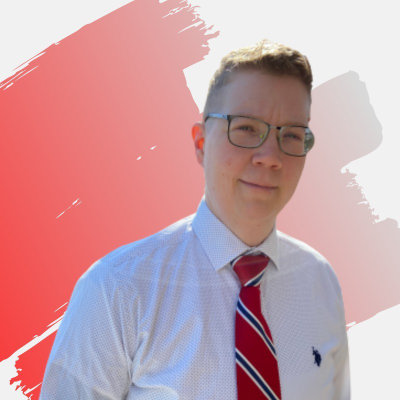Public service heroes: Aubrie McGibbon
Aubrie McGibbon is a long-time open data and public sector innovation expert with the Nova Scotia government. They’re currently the data strategy lead for the Nova Scotia Digital Service, and they previously co-led NS Govlab, Nova Scotia’s first social innovation lab. Aubrie and I have been Twitter friends since my very first month working in government; I’m so glad they could be part of the series. We chatted by email in June.
How did you get started in the public service?

My first exposure to government was as a landscaping labourer with the municipality I grew up in. It was rewarding to see the work I was doing serving others – even if it was limited to making sure the grass was cut. Both of my parents worked in public service and encouraged it as an option growing up.
I completed my undergraduate and graduate degrees in Ottawa and was able to complete an internship with the Department of Justice and was later bridged in as an indeterminate employee. After a few years of service with the Government of Canada, I had the opportunity to move to Halifax. I was able to secure a one-year contract with the provincial government, and 11 years later, that one-year contract turned into the opportunity to work with the Department of Economic Development, the Department of Justice, the Emergency Management Office, a social innovation lab and the Nova Scotia Digital Service.
Tell us about an inspiring or memorable moment in your public service career
My inspiring moment was appreciated in the moment, but I do not think I truly recognized the gift it was at the time. With the Research and Statistics Team at the Department of Justice Canada, research projects were a big chunk of the workplan. Junior Analysts were encouraged to bring forward ideas and contribute to the body of research. Everyone had at least one research project – the amount of projects and the sophistication of the methodology was often determined by rank and experience.
Regardless of the project, all ideas required a short proposal. These were submitted to Senior Researchers, then forwarded to the entire team. Once every two weeks (if memory serves), we met in a large boardroom and reviewed a batch of proposals. Everyone was expected to have reviewed the work and anyone could ask questions of the proposal. Many an interesting discussion occurred around that table.
In hindsight, the magic was the design of the meeting. Junior staff were expected to listen and learn and contribute. This was in the early days of web 2.0, so there was a very definite area for contribution not only with what we were learning with coursework, but also what we were learning from connecting with folks online and outside of a traditional network.
I recall the table being challenging, but honest and fair. I learned more from that experience than in some graduate courses. It was a masterclass in research, methods, navigating the bureaucratic system and weighing social ramifications and implications (regardless of political stripe holding office).
If there was one thing you could change about the public service, what would it be?
At a systems level, I would eliminate the amount of friction and discord that comes from the three peaks of bureaucratic death – HR, procurement and budget. I have lost count of the number of innovative, out-of-the-box and inspiring work and ideas that have fallen victim to at least one of these three peaks.
Working in the data space within a digital transformation context, this tension feels crushing some days.
At an individual level, I would fundamentally transform the current approach to recruitment and retention. In addition to not yielding the outcomes we need, I would like to see a much more diverse workforce. When I think about some of the friction and discomfort I experience, I often wonder how this translates to users. As an example, as someone who identifies as non-binary, pronouns are an Olympic sport for me. As I navigate the challenge(s) of using different pronouns in the workforce, I wonder how this shows up for trans and non-binary folks trying to access government services in a respectful and inclusive way.
I should add that my experience also includes a ton of privilege, so my experience is very different from others. Knowing this, the discomfort and sense of not being seen as I perceive myself reminds me how important my work is to supporting government products and services that are suited for everyone where they are currently at.